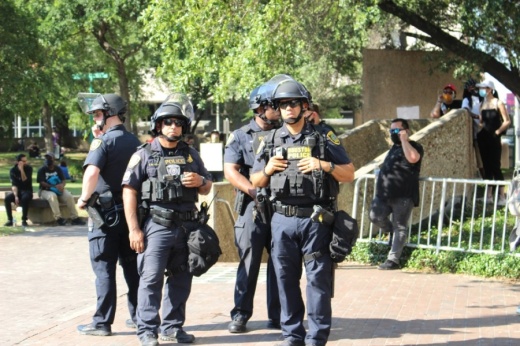The purpose of the meeting was to review how the Houston Police Department and its coordinating entities respond to and investigate officer-involved shootings. Council Member Abbie Kamin, chair of the committee, organized the meeting in response to a string of six police shootings in Houston since January.
With renewed focus on the issue spurred by the death of Houstonian George Floyd in Minneapolis in police custody and the subsequent nationwide protests, many speakers reported growing impatience with the results of previous police reform efforts.
“We deserve a seat at the table. ... Everything that I have heard up until this point has been the same old rhetoric for 40 years. Now, it's time for no more reform; it's time for change,” said Synnachia McQueen, who lives in Third Ward, the same neighborhood Floyd was from.
A series of exchanges between City Council members and the chair of the Houston Independent Police Oversight Board, Marvin Hamilton, exposed a lack of transparency that many speakers latched onto during the comment session.
When Council Member Edward Pollard asked Hamilton how a member of the board becomes chair, Hamilton replied, “Simply by being a good panel member.”
When Pollard asked who makes that decision, Hamilton replied that he, the chair of the board, decides who serves as chair.
After an unclear explanation of what types notations the oversight board takes of its weekly meetings, Hamilton told Council Member Carolyn Evans Shabazz that he cannot release meeting notes to the public but can confirm that they exist.
“I had a whole spiel ready for this, but after the presentations, I was underwhelmed,” commenter Timothy Green said. “The oversight committee has incompetent leadership. That was a joke.”
Shelley Kennedy, a former candidate for the Houston City Council District C seat held by Kamin, called in to comment and said that she believed the board needed more independence from the police department, the power to issue subpoenas and more ability to communicate their findings.
“I am a current member of the Independent Police Oversight Board, and we are not allowed to speak on any of the cases we review,” Kennedy said. “But as an activist, it keeps me up at night. When I suggested that there be a liaison to City Council to be able to see what we see, the answer given to me was that the Office of the Inspector General was the liaison, but they didn’t see the same footage we do.”
Some of the dozens of speakers who called in asking for reduced police funding cited the lack of transparency among police oversight boards boards and its lack of independent authority as an example of failed police reform efforts.
“This whole call has shown us that reform does not work. These measures of psych testing and wellness are valued and appreciated but not mandatory. The process of screening cops who are moving around is not transparent, and the chief who called in—the policy wasn’t even clear to him,” speaker Loyce G. said. “How are we supposed to truly believe that all these measures put into place to actually make sure that everybody is accountable are even working?”
The speaker said she echoed other commenters who called for a 25% decrease in police funding per year and, ultimately, the abolition of the department.
Others, however, still saw opportunities for reform.
“One solution is about creating an oversight board to reflect us, chosen by us and that also is inclusive with some law enforcement officers but also stakeholders who have a vested interest in our communities,” said Angela Johnson, an Acres Homes resident and member of Texas Organizing Project. “We need principals, people like myself who are former law enforcement officers, past sheriffs, food service workers, bus drivers, coaches—these are the people who are actively communicating with our communities every day.”
The contract between the city and the Houston Police Officers Union was also the target of calls for increased transparency and accountability. The contract outlines salary and benefits, such as pension and liability insurance for the city’s police officers. Negotiations are ongoing leading up to the contract’s expiration Dec. 31, 2020.
A lawyer for the Texas Workers Defense project laid out a series of policy suggestions, including keeping the contract negotiations open to the public.
Contractual obligations make up 92% of the police budget, meaning they could not be altered during the June 10 City Council vote.
Kamin said that a compilation of all the comments and suggestions offered at the June 25 meeting in addition to answers to questions asked by public speakers will be available to the public by July 15.





